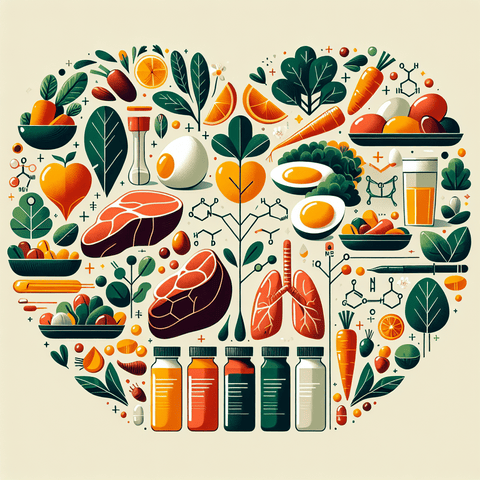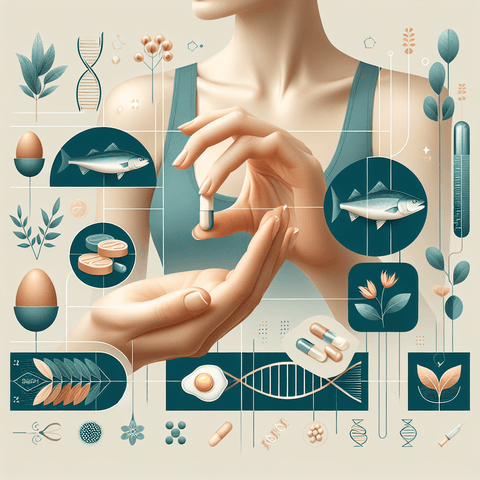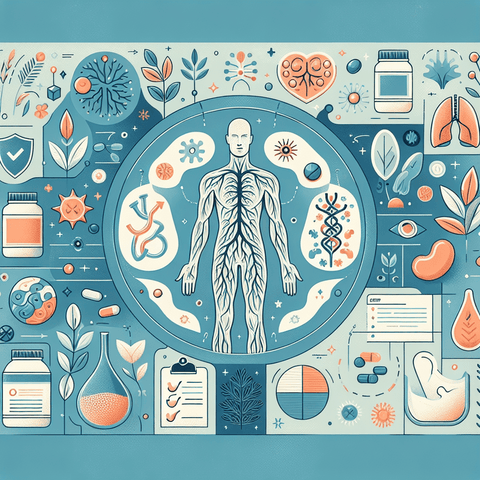Understanding Vitamin A in Nutritional Supplements: The Essential Nutrient for Vision, Immunity, and Overall Health
Vitamin A plays a critical role in maintaining health, influencing functions such as vision, immune function, reproduction, and cellular communication. As a fat-soluble vitamin, it exists in multiple forms with differing biological activity and dietary sources. The two primary forms are preformed vitamin A (retinol and retinyl esters) and provitamin A carotenoids (such as beta-carotene), which the body can convert into active vitamin A.
Vitamin A is essential for maintaining the surface tissues of the eyes and skin, aiding immune system resilience, and supporting cell growth and specialization. For these reasons, ensuring adequate intake of this nutrient is crucial for the body to function optimally. While vitamin A can be obtained through a well-balanced diet, many individuals may require supplements due to dietary restrictions, health conditions, or increased physiological needs. This necessity makes vitamin A a key nutrient prominently featured in nutritional supplements designed for supporting general wellness.
In the realm of dietary supplementation, vitamin A is commonly available in two forms: retinyl palmitate (preformed vitamin A) and beta-carotene (provitamin A). Each form has different absorption efficiencies and is often tailored to specific dietary needs. For example, retinyl palmitate is typically included in broad-spectrum multivitamins, while beta-carotene is often marketed in supplements targeting antioxidant support due to its additional benefits as a dietary antioxidant.
Supplementing with vitamin A may be advisable in populations with diets low in animal products, in individuals with malabsorptive disorders, or where regional deficiencies are known to occur. In choosing a supplement, quality and formulation are important—consumers should look for accurately dosed supplements that clearly specify the type of vitamin A present. Additionally, it's valuable to explore synergistic nutrient formulations. For example, omega-3-rich supplements such as those found in the Topvitamine DHA & EPA Omega-3 Supplements category can work alongside vitamin A to support eye and brain health.
As with any nutrient, more is not necessarily better. Because vitamin A is fat-soluble, it can accumulate in the body, potentially causing toxicity if taken in excess over time. For this reason, individuals should aim to reach recommended daily intake levels through both diet and properly dosed nutritional supplements, especially if guidance from a healthcare provider is not sought regularly. Combining both food-based and supplement-based sources is often the most practical way to optimize vitamin A intake while minimizing risk.
Retinol Sources: Animal-Based Foods Rich in Preformed Vitamin A
Preformed vitamin A, or retinol, is the most bioavailable form of vitamin A and is found only in animal-derived food sources. Once ingested, it is readily used by the body without the need for conversion. This form is crucial for maintaining systems such as vision, particularly in converting light into nerve signals in the retina, and for ensuring immune functionality through the maintenance of mucous membranes and lymphocyte activity.
Among the richest natural sources of retinol, liver stands at the top. Whether it's beef, chicken, or fish liver, all are concentrated with vitamin A. Beef liver, for instance, contains more than 6,000 micrograms of retinol per 100 grams—a value far exceeding daily recommended intake levels. While potent, the high concentration in liver means it should be consumed in moderation to prevent toxicity.
Other significant animal-based sources of vitamin A include full-fat dairy products such as milk, cheese, and butter. These not only deliver bioavailable retinol but also provide fats necessary for its efficient absorption. Eggs, particularly egg yolks, also contribute modestly to vitamin A intake while offering the advantage of additional nutrients like choline and vitamin D.
It's important to understand the dietary challenges faced by people who follow particular eating regimens. Vegetarians who consume dairy and eggs (lacto-ovo vegetarians) can still access retinol through these sources, but vegans must rely entirely on plant-based provitamin A carotenoids. Individuals with dietary restrictions who exclude most animal products must consider fortified foods or vitamin A supplements, especially those designed with plant-derived actives or synthetic versions of retinyl esters or beta-carotene suitable for vegan use.
Supplement solutions derived from retinol can provide a consistent source of vitamin A for individuals who may not consume sufficient amounts from animal sources. As such, quality formulations such as those available from curated collections like the Vitamin D & Nutritional Safety Products at Topvitamine often include complementary fat-soluble vitamins (like D and K) ensuring well-rounded nutrient delivery and bioavailability.
Despite the benefits of preformed retinol intake, awareness of the upper limits is important. Excessive intake from animal liver or corresponding high-dose supplements can lead to toxicity symptoms including nausea, dizziness, and dry skin. Regular, moderate intake through a balanced diet combined with tailored supplementation remains the safest and most effective strategy.
Carotenoid-Rich Foods: Plant-Based Sources of Provitamin A
For those seeking vitamin A from plant-based sources, provitamin A carotenoids—especially beta-carotene—are a critical component. Carotenoids are pigments naturally found in colorful fruits and vegetables that the body enzymatically converts into retinol as needed. This conversion feature makes provitamin A a safer option for many because the body regulates its conversion to avoid excess vitamin A intake.
The most recognized sources of provitamin A carotenoids include orange and yellow vegetables such as carrots, sweet potatoes, pumpkins, and butternut squash. Just one medium carrot may deliver up to 500% of the daily recommended intake when converted efficiently. Bright-colored peppers and winter squashes also contribute significantly to carotenoid intake and offer the benefit of dietary fiber and other phytonutrients.
Leafy greens such as spinach, kale, mustard greens, and collard greens are also excellent sources of beta-carotene despite their green appearance. This is due to chlorophyll masking the orange pigment of carotenoids. These foods additionally provide important micronutrients like magnesium and vitamin K, contributing to better overall nutrition. For individuals interested in synergistic benefits, exploring the Magnesium for Energy and Bone Health Collection can offer supportive nutrients to pair with carotenoid-rich foods.
Recent research supports eating these vegetables as part of a meal that includes dietary fat, such as olive oil, avocado, or nuts, to enhance the absorption rate of carotenoids. Furthermore, cooking methods such as steaming or pureeing carrots and spinach can help release more bioavailable beta-carotene by breaking down plant cell matrices that otherwise inhibit absorption.
For those unable to consume adequate carotenoids through diet, supplements featuring beta-carotene sourced from algae or other vegetarian-friendly origins are excellent options. Many high-quality multivitamin formulations or specialty antioxidant supplements include beta-carotene in liquid, capsule, or softgel formats and can be found from reputable suppliers such as Topvitamine. These convenient products ensure that individuals on restricted diets can still meet their vitamin A needs effectively.
Vitamin A Deficiency: Recognizing and Addressing a Common Global Health Issue
Vitamin A deficiency is a significant public health concern, especially in developing countries. It contributes to the morbidity of infectious diseases, impairs vision, and is a leading cause of preventable blindness in children. Deficiency can also affect pregnant and lactating women, causing maternal mortality and increasing the likelihood of complications during childbirth.
Symptoms of vitamin A deficiency include dry skin, night blindness (difficulty seeing in low light), frequent infections, delayed wound healing, and, in severe cases, complete vision loss. The deficiency stems from inadequate intake, fat malabsorption issues, or increased physiological need during illness or growth. Children between the ages of 6 months and 5 years are particularly vulnerable due to their rapid developmental needs.
Vitamin A deficiency is preventable through a diet that includes sufficient retinol or carotenoid sources and, when needed, through oral supplementation. UNICEF and the World Health Organization emphasize the use of high-dose vitamin A supplements for children in at-risk regions to reduce child mortality and prevent blindness. These strategies have already made a significant impact in reducing the public health burden in many low-income settings.
In developed countries, deficiency is rare but not impossible. It can occur in individuals on extremely low-fat diets, those with eating disorders, those with gastrointestinal illnesses that impair absorption such as Crohn’s disease or celiac disease, and individuals consuming unbalanced vegan diets without supplementation or consistent access to fortified foods.
Supplements formulated with preformed vitamin A or beta-carotene can be part of a global health strategy, especially in vulnerable populations and individuals with restricted diets. Consumers looking to prevent deficiencies and support immune health can benefit from exploring high-quality immune-boosting supplements like those in the Vitamin C and Immunity Collection at Topvitamine, allowing them to incorporate not just vitamin A, but other essential co-factors aiding in immune resilience.
Plant-Based Vitamin A: Navigating Vegetarian and Vegan Sources
Plant-based diets, when properly planned, can provide sufficient vitamin A through a generous intake of carotenoid-containing vegetables. However, vegetarians and vegans must remain vigilant because they lack access to retinol through diet. This group relies entirely on carotenoids for their vitamin A supply, which the body must convert enzymatically—a process that varies among individuals and may be affected by genetics, health conditions, and dietary fat intake.
To mitigate absorption issues, strategies to improve bioavailability become crucial for plant-based eaters. Beta-carotene in foods like carrots, sweet potatoes, and kale should preferably be consumed with fats from avocado, coconut oil, or fortified plant-based spreads. Cooking these vegetables can also enhance the release of carotenoids, increasing their usable benefit.
Vegan-friendly vitamin A supplements typically utilize beta-carotene extracted from natural sources like algae or synthesized versions free from animal products. These supplements are available in a variety of forms, including capsules, drops, or softgels. When selecting a supplement, it’s essential to choose a reputable source that offers verified formulations without unnecessary additives. Topvitamine offers a variety of vegan-compliant wellness products across numerous categories focused on purity, bioavailability, and dietary preference accommodation.
Because retinol is more bioavailable than carotenoids, vegans and strict vegetarians may need to consume higher levels of provitamin A to meet their physiological needs. Health practitioners often recommend routine blood tests to monitor vitamin A status in those on long-term plant-based diets, especially if symptoms such as vision changes, immune issues, or delayed healing present over time.
For a well-functioning immune system and visual health, boosting intake of not only carotenoids but also essential co-nutrients such as vitamin D and K can improve nutrient synergy. High-quality combinations, such as those found in the Vitamin K & Bone Health Supplements collection, often pair well with beta-carotene for rooted wellness support.
Dietary Vitamin A: Incorporating the Nutrient into a Balanced Diet
Incorporating vitamin A into your daily meals is not difficult when you adopt a food-first strategy encompassing both animal and plant-based sources. For omnivores, alternating between liver products, dairy, eggs, and bright vegetables can maintain vitamin A stores efficiently. Try integrating scrambled eggs with spinach, roasted sweet potatoes, steamed kale, and grilled liver pâté into your weekly routine. A drizzle of olive oil enhances both the flavor and the carotenoid absorption.
Vegetarians can achieve balance through hearty stews enriched with carrots, lentils, and kale, topped with a spoonful of yogurt for fats. Smoothies blending leafy greens, mangoes, and almond butter are also delicious and vitamin A-rich. For those practicing a vegan diet, combinations of cooked greens, nut butters, and vitamin-fortified plant milks can help bridge any nutritional gaps.
Choosing supplements wisely is just as important as selecting fresh produce. Look for third-party tested products, specified retinol or beta-carotene content, and proper capsule formulation ensuring bioavailability. Integrating high-quality supplements from trustworthy platforms such as Topvitamine ensures consistency in nutrient delivery. Whether you're managing deficiencies or proactively supporting health, supplements provide a reliable nutrition strategy for modern busy lifestyles.
For individuals with specific health challenges or restrictive diets, consulting with a healthcare professional or registered dietitian can lead to a customized approach to vitamin A supplementation. This helps avoid overconsumption and ensures balance across fat-soluble nutrients. Ultimately, maintaining optimal vitamin A levels promotes resilient health across systems ranging from the eyes to the immune system and beyond.
Conclusion
Vitamin A is a vital nutrient that supports many bodily functions, especially vision, immune defense, skin health, and reproduction. Sourcing it effectively through both animal-based retinol and plant-based carotenoids provides diverse dietary options suited for omnivores, vegetarians, and vegans alike. While animal livers and full-fat dairy provide concentrated retinol, deeply colored vegetables like carrots, spinach, and sweet potatoes enrich the diet with provitamin A.
Supplementation plays a pivotal role in preventing and correcting deficiencies, especially for individuals at risk such as children, pregnant women, or those with dietary restrictions or health conditions affecting nutrient absorption. With safe, high-quality formulations available from dedicated health platforms such as Topvitamine, people from all lifestyles can find the right product to meet their specific needs.
Combining mindful eating with intelligent supplementation ensures the daily requirements of vitamin A are met consistently, supporting long-term health and well-being.
Q&A Section
Q: What are the best animal-based sources of vitamin A?
A: The best animal-based sources include liver (especially beef and fish liver), full-fat dairy products (such as butter and cheese), and eggs.
Q: Can I get enough vitamin A on a vegan diet?
A: Yes, provided you consume sufficient carotenoid-rich foods like carrots, spinach, and sweet potatoes, and make sure to include fat for optimal absorption. Vegan supplements with beta-carotene can also help.
Q: How can I improve my body's ability to absorb carotenoids?
A: Include dietary fats in your meals (e.g., olive oil, nuts, avocados), cook vegetables lightly, and blend plant foods for better cellular breakdown and nutrient release.
Q: Who is at risk of vitamin A deficiency?
A: Children, pregnant women, and individuals with digestive disorders or restrictive diets are especially at risk. Supplementation and fortified foods are key strategies for these groups.
Q: Are vitamin A supplements safe?
A: Yes, when used within recommended dosages. Always follow guidance from healthcare providers and avoid excessive intake from both supplements and liver-based foods.
Important Keywords
- Vitamin A sources
- Retinol foods
- Carotenoid-rich vegetables
- Beta-carotene
- Vitamin A supplements
- Vitamin A for vision
- Preformed vitamin A
- Vegan vitamin A options
- Vitamin A deficiency prevention
- Topvitamine supplements



